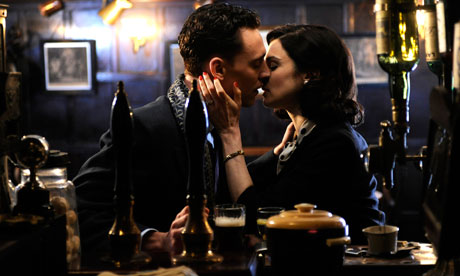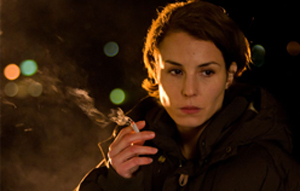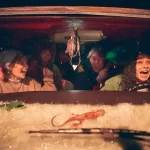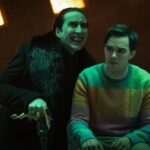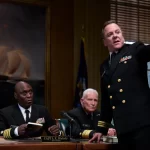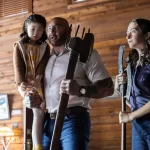European Union Film Festival Week Two
Every March, for the past 14 years, the Gene Siskel Film Center in Chicago, Illinois brings a wide variety of new films from around Europe during the European Union Film Festival. This year’s festival has films from 27 countries and 65 Midwestern premiers. Each week of the festival, I will bring a few select reviews from the schedule’s diverse selections.
THE DEEP BLUE SEA (United Kingdom), directed by Terence Davies
The Deep Blue Sea is the anti-screwball comedy. Anyone who knows Terence Davies’s work wouldn’t be surprised. There is a wonderful succinctness of language in this film that is absolutely compelling to me — for a film based on character relationships and high drama, very little is said and very few big dramatic moments happen. Between each line there is a bit of stillness, silence that we aren’t accustomed to seeing, and it is absolutely breathtaking. It is extra remarkable that The Deep Blue Sea is based on a highly regarded British play, as the film is completely void of exposition and “talkiness.”
Rachel Weisz stars as Hester, the wife of a judge who falls in love with a young war-time pilot (played by Tom Hiddleston). The film beautifully chronicles their short affair by leaving out much of the romance and focusing on their inability to completely love each other. And that’s basically all. Although there is a complete narrative within The Deep Blue Sea, it focuses much more on emotion than plot.
Davies is able to do so much with so little. The characters in the film only say what they need to say and, though a heavy film, only display heavy emotions when absolutely necessary. The multiple conflicts that happen throughout The Deep Blue Sea are done quietly, the characters act with dignity — which ultimately makes the few scenes that explode have even more effect. Watching very proper British people talk calmly about love might not seem like the most exciting material but Davies and the cast are able to tell this story with such sensitivity that it bulges with emotion. The use of music aids very much in this — outside of the opening sequences which feel almost operatic with constant music, there is absolutely no non-diegetic music, emphasizing the breaks in dialogue and pulsing quietness. There are a few scenes of groups of people singing together (a staple in the auteurship of Terence Davies), which highlights the lack music elsewhere.
Those in attendance at the festival were treated to a Q&A from the director, who is as charming as you’d imagine but much funnier. He not only gave a number of great insights into his filmmaking but told a number of great anecdotes including how he came to cast Rachel Weisz in the role (he had no idea who she was until she was cast) and that he has an original script on the life of Emily Dickinson that he hopes to make. One particular insight that I found interesting was on the differences between the original play and the script he adapted. Terrence Rattigan’s play is incredibly heavy on exposition, which was completely reworked, as well as telling the entire story from Hester’s perspective and simply focus on the relationships of the three main characters. As Davies said, this decision was “dead simple” and I couldn’t agree more with it.
THE RUNWAY (Ireland), directed by Ian Power
Without knowing anything of the plot, I decided to see The Runway solely on the fact that it stars 2011 Oscar nominee Demián Bichir. For anyone who actually saw it, his role in A Better Life was truly worthy of its high praise. His performance in this small Irish coming-of-age film is completely different. Instead of his extremely restrained, but heartbreaking portrayal of an illegal immigrant willing to do anything for his son, we have his take on a charismatic, stoic stranger. I doubt many who first saw him in A Better Life looked at him like the Mexican sex symbol he is but you can really see it here. As one character says to him he does a lot of “sit[ting] around, looking handsome and smug.”
Still, he is never too serious, matching the tone of the film, which is a true-story-ish coming-of-age crowd-pleaser akin to Danny Boyle’s Millions and even The Blind Side. The film follows a young boy growing up in a dying Irish town without a father and a too-busy mother. But when a stranger (Bichir) crashes his plane in the countryside, the town comes alive and the boy finds a much needed friend and father figure. Like the other two films I previously mentioned, it takes what could be pretty heavy material and lacquers it with a coat of sugar. In this case, it’s probably for the best, though I don’t know if there is quite enough substance in the real-life story for a completely compelling film.
As the film progresses it brings in a plot of Bichir’s stranger being a possible criminal, the only real dramatic plot-point in the film. But as the film never really set up this possibility through the first two acts, it never comes together — ultimately feeling like the film needed to stretch out plot points and tried to tack on some drama. I’ve heard somewhere that you should never introduce a new character in the third act of the film (which The Runway is guilty of), introducing an entire new plot device doesn’t really work either. Even though Ernesto comes out of nowhere and doesn’t like to speak much about himself, this isn’t enough of a reason to think he is actually dangerous or a fugitive on-the-run. And since the characters all seem to warmly welcome the stranger without question, why wouldn’t the audience? Strangely, just about as soon as the film introduces the possibility of a criminal past, it is quickly revealed he actually isn’t running away because he committed a crime — though it isn’t really explained why he’s on the run. I don’t know this for sure, but it definitely seems like a creation of the screenwriters steering away from the true story.
The Runway isn’t for the cynical. Those not willing to take the film on it’s true story face value probably won’t be moved during the final scenes. It is, however, a crowd-pleaser of the fullest order and I imagine many audiences will enjoy it — many in the crowd during the festival applauded as the credits began. But I doubt Bichir’s new-found success in the U.S. will be enough for many audiences to get the chance. But, hey, I’m one of those cynics.
BEYOND (Sweden), directed by Pernilla August
Like The Runway, I bought a ticket for Beyond solely based on the film’s star — this time Noomi Rapace, in her first film after the famed Girl with the Dragon Tattoo series (Sherlock Holmes was filmed afterward). Given the nature of her previous work and the snappy title of this film, I went in expecting some sort of stylish thriller but I got something completely different. Beyond begins with Leena (Rapace) receiving a call from her dying mother, wishing for her to visit her before she dies. As we see Leena struggle with the emotions involved with this situation, the film frequently cuts back to when Leena was a young girl, chronicling her life growing up in a household filled with alcoholism and abuse.
While Rapace is the draw in the film, she really isn’t the star. That would be Tehilla Blad, who plays the child version of Leena with incredible bravery and emotion. Coincidentally, Blad was also seen in the Girl with the Dragon Tattoo series, playing the young Lisbeth Salander in flashbacks. In Beyond, most of the narrative is told from the past, along with most of the heavy dramatic moments. Because of this, it is much more difficult to connect with the adult version of the character — we can sympathize what she has been through but it’s much easier to feel for the young girl who is actually going through the painful moments in her life. Still, when Rapace is on screen, she is great — only knowing her as Salander, it is nice to see her show emotion.
While I like the split narrative in the film, it does bring a unique problem. Typically in a film told like this the audience is emotionally tied to the adult looking back but Beyond doesn’t satisfactorily flesh out the adult Leena. The film becomes much less about coping with or overcoming a shattered life and more about living through it. This makes the film more harrowing than emotionally satisfying — not a problem, per se, but this doesn’t allow the audience any release. Instead of being able to fully cope with the narrative, we are pounded down by terrible conflicts and circumstances. Within the first minutes of the film, Leena receives the call from her mother and we quickly begin the series of flashbacks that fill most of the film. Without giving away too many specifics, the film also ends as soon as Leena’s mother dies, without any postscript. This is a bold move for a narrative structure and contributes to the problem I had with connecting to the character.
Stylistically, the film reminds me of the Dogme 95 movement. While it doesn’t adhere to all the rules of Dogme, many influences are apparent, such as the minimal and natural lighting and hand-held camera. Narratively, Beyond obviously fits in with many Dogma films with the depressing tone, but it also keeps the plot simple, without any extraneous matter. Even though terrible things happen to the central family, most of the drama arises in situations many of us have had to deal with — listening to our parents argue through your bedroom wall, problems dealing with alcohol, etc. Thus, while we see some awfully traumatic things, it is also extremely easy to relate to the character.
Beyond explores the idea that everyone is informed by their past, but not everyone chooses to show it. Personally, I connected strongly with the film — it shows how difficult it is to shed a troubled past, that no matter how easy it may seem to run away, you must always face your past at some point in your life.

